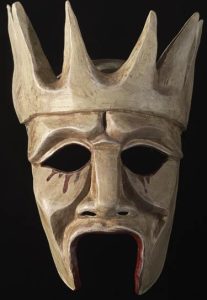 He is one of the most tragic heroes ever found in literature; a man so unfortunate in the eyes of the gods, that he eventually blinded himself. He forces the question of fate, of self determination, of questioning society and divinity itself. Some may say this was his fatal flaw, his resistance to the life laid out for him. Others hold this as his most redeemable feature. In today’s world, we praise those who break free of their social ranks, their confined destinies. We look on social structures like the caste system and class determination as an affront to free will. Oedipus had his life prescribed to him from youth, and tried at every opportunity to leave it. Even when all the signs of its truth began to show, he still rebelled against his lot and ignored and resisted it until he could no longer. But is Oedipus Rex moral or a murderer?
He is one of the most tragic heroes ever found in literature; a man so unfortunate in the eyes of the gods, that he eventually blinded himself. He forces the question of fate, of self determination, of questioning society and divinity itself. Some may say this was his fatal flaw, his resistance to the life laid out for him. Others hold this as his most redeemable feature. In today’s world, we praise those who break free of their social ranks, their confined destinies. We look on social structures like the caste system and class determination as an affront to free will. Oedipus had his life prescribed to him from youth, and tried at every opportunity to leave it. Even when all the signs of its truth began to show, he still rebelled against his lot and ignored and resisted it until he could no longer. But is Oedipus Rex moral or a murderer?Most are familiar with the basics of the story. Oedipus Rex, or King Oedipus, infamously slept with his mother and killed his father. It’s a myth that existed long before Sophocles wrote the play, and has fascinated authors, philosophers, painters, musicians and intellectuals throughout history. Freud, a more contemporary example, is famous for his assessment of the myth with regards to the modern mind. Unfortunately he missed the point, as Oedipus never wanted to have relations with his mother. He did so unknowingly… and when he found out, was horrified to learn of the nature of his deed.
Sophocles’ version, however, is arguably the most famous as well as the most powerful telling of the tale. He knew the story well and wrote repeatedly on the myth, including two other plays, Antigone and Oedipus at Colonus, which rounded out the tragic legend.
Oedipus Rex is the first, chronologically, of these three plays. A good deal of the action, however, happens before the play even begins. Sophocles’ audience would have known the whole Oedipus myth, from start to finish. As a result, Sophocles does not write about the very beginning of the story; he just references key points as reminders.
Sophocles’ play describes Oedipus’ discovery of his origins. Unfortunately for him, the revelation of his not-so-humble beginnings brings to light a history of atrocities that Oedipus had unknowingly committed…acts that uncompromisingly expose some of the most imbedded taboos in western society.

But let’s start in the beginning. It all originates with a foreboding oracle. Two regal parents of Thebes receive a note from the gods prophesying that their son will murder one and sleep with the other. Distraught at the news, they hand him over to a servant to bind his feet and leave him to die on a mountain. However, the sight was distasteful to a shepherd who rescued the boy and passed him to a foreigner to be raised in another land. Here the young Oedipus finally had a turn of good luck, as he was given to the childless King and Queen of Corinth and reared as a prince.
Then fate steps in once more. Chided for being adopted, Oedipus consults the oracles to find out if it is true. There he is told of his horrid destiny, that he will kill his father and sleep with his mother. Determined to not let it happen, he leaves town at once. On the way, he fights with a traveller at a crossroad, kills him and thinks of it no more. He enters the town of Thebes and, by luck or intelligence, answers a Sphinx’s riddle and saves the city. The inhabitants are overjoyed and reward this stranger with the late king’s throne and bed. Years later a plague hits the town.
Sophocles begins his tragedy here…
Now Oedipus begins to the learn the truth as it quickly unravels. He appears brash, frantic, and constantly in motion, as if he is trying to keep up with his fate. The audience falls in and out of empathy with him. At one moment he is a great and compassionate king, the next a bully to an old blind man. In turns he switches from tragic to irrational, a sad man fearing what will happen to an overly suspicious monarch enacting unwarranted, unilateral ‘justice’. Once again he flips from a caring and concerned husband to an interrogator, threatening torture and death to an elderly shepherd. It is a rollercoaster of emotion and suspense.
Then the whole sordid story is revealed, that the traveller in the crossroads was his father, that his sore feet are from his childhood bounds, and that the mother of his children is his own flesh and blood. As a result, his wife/mother hangs herself and the wretched Oedipus pierces his eyes before fleeing into exile.
What, then, are we to think of this man? Hero or monster? Menace or martyr? Is Oedipus Rex moral or a murderer?
In each situation, Oedipus is presented with a choice, to let sleeping dogs lie…or find out the real truth. At every juncture, the condemned, but determined man is warned that the truth will be difficult, unpleasant and even harmful. And in each case, Oedipus chooses truth, no matter what may come of it. He chooses the red pill of reality over delusion and the unknown. He remains, until the end, faithful to himself. And when the truth…the full, horrible truth…is revealed, he does not shy away. Oedipus takes full responsibility for his actions even though, at the time, he did not know what he was doing.
No doubt each reader will come to their own conclusion and decide whether they find favor with this extreme individual. In any case, we may well be pressed to find such a noble and honest person nowadays.
Oedipus the King was written by Sophocles around 430 b.c. Produced in Athens, Greece. You can read the full story here: https://classicalwisdom.com/greek_books/oedipus-the-king/
Oedipus Rex Moral or Murderer? was written by Anya Leonard for the inaugural publication of the Classical Wisdom Weekly newsletter.
Make sure to read the next installment of Sophocle’s trilogy, Oedipus at Colonus , for next week’s essay. You can view the whole text here for free: https://classicalwisdom.com/greek_books/oedipus-at-colonus/









7 comments
This is a most useful cnotriubtoin to the debate
Your asnewr was just what I needed. It’s made my day!
I simply want to say I am very new to blogging and site-building and really enjoyed you’re page. More than likely I’m going to bookmark your site . You definitely come with beneficial articles. Appreciate it for sharing your webpage.
This web site is my intake, very wonderful style and design and Perfect content.
aaaaaaaaaaaaaaaa
If I may ask, or if you do know, how was the mask made in this picture? If you could just reply to this or if possible my email at [email protected]
You can definitely see your enthusiasm within the work you write.
The sector hopes for even more passionate writers like you who aren’t afraid to say how they believe.
Always go after your heart.
Trackbacks
Our apologies, you must be logged in to post a comment.